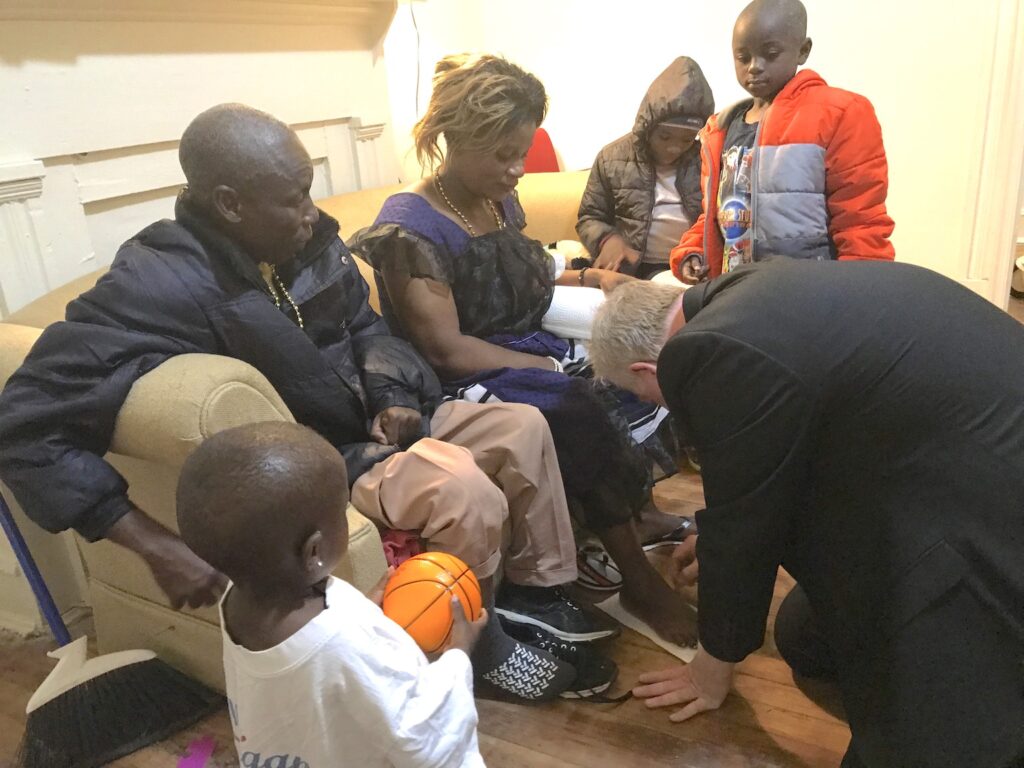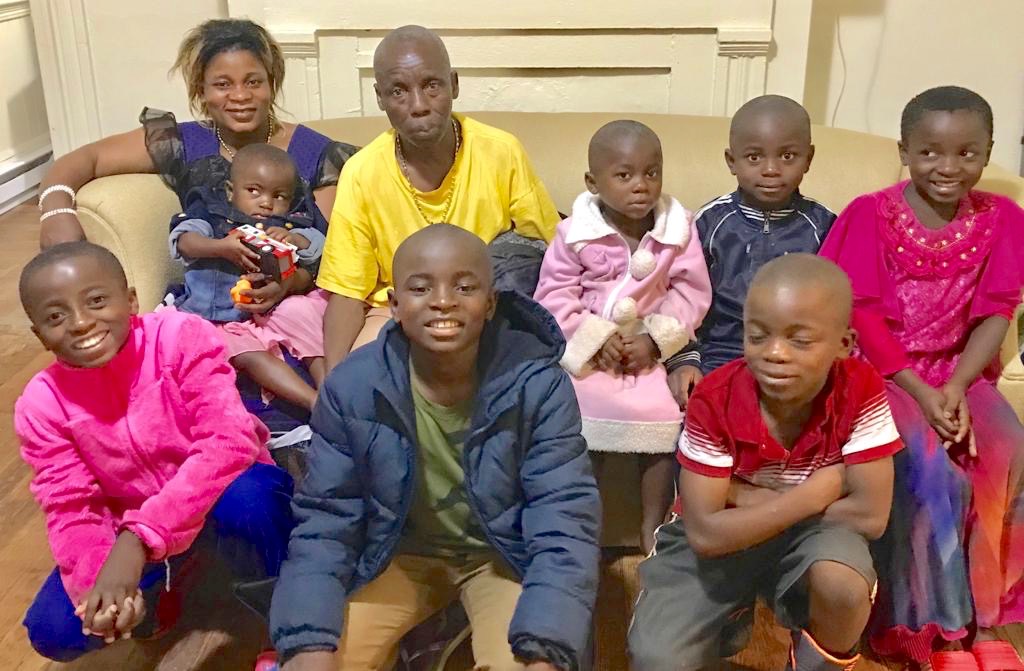St. Elizabeth parishioner honored by International Rescue Committee
For 21 years, Abedi Shishi waited. He survived a serious fall as a baby that left him permanently disabled. He survived a childhood in the Congo, a place of perpetual political unrest, wars, coups, poverty and corruption.
He survived a dangerous escape from his native country to an unknown land. And then, for more than two decades, he lived in a Tanzanian refugee camp, waiting, hoping and praying that one day he and his family would make it to safety in the United States.
At 6 months old, Shishi’s babysitter dropped him, injuring his left arm and leg. The nearest hospital was a two-week walk away. By then the damage was permanent. He would remain partially paralyzed his whole life.
The local Catholic parish where his uncle worked gave him an education. He graduated from high school and was trained by the parish to be a teacher — no small feat in a country where only about one-quarter of children aged 12-17 attend school.
Hope instead of despair
When the First Congo War with Rwanda broke out in 1996 and the government declared that all men must join the military, Shishi knew he had to leave. Physically unable to fight and spiritually unwilling to shed blood, he fled.
He escaped through a network of priests who provided him with money, transportation and shelter along the way before arriving in Tanzania at the age of 26.
Where many might see despair, Shishi found hope. He spent his time in the refugee camp helping others, making a family and building a life. He was recently recognized with the Gender Equality Champion Award by the International Rescue Committee (IRC) for his efforts while in the camp.
The IRC, an international humanitarian aid program that provides water, shelter, education, health care and other support to refugees, has offices throughout the world, including Richmond. Along with St. Elizabeth Parish, Richmond, the IRC was instrumental in helping the Shishi family start their life in the United States.
“I never lost faith in God or the future,” Shishi said, speaking through an interpreter.
Caring for others
A proponent of education equality, he used his training as a teacher to set up programs for boys and girls in the refugee camp. He taught them French, the official language of the Congo, and Swahili in an effort to preserve their cultural identity and heritage. He also organized soccer games and art projects to keep the children — and adults — active and in high spirits.
Though aid was available at the camp, it often was not enough to feed its 7,000 occupants. He and other refugees pooled whatever food and money they could spare to make sure more of them had enough to eat.
Shishi helped establish a camp choir in which he and his wife Neema, whom he met and married at the camp, sang. His four sons and three daughters, ranging in age from 3 to 17, were born in the camp and followed in their parents’ footsteps.

“We all sing because it makes us feel closer to God,” Shishi said. “We spread the Word of God through songs.”
In 2018, Shishi learned that he and his family would be granted refugee status and be allowed into the U.S. They arrived without shoes, without money and without speaking or understanding English.
The local IRC office helped the Shishi family find a house, register the children for school, obtain social security numbers and procure jobs. It also provided English language lessons and food stamps, and paid their bills for several months while the family got settled.
Helped by parish
In the year since their arrival, the Shishi family has realized that while they thought the United States was “the ideal country,” as he called it, in reality, it has problems too. The greatest shock to their children was the discovery that homelessness exists here, something they never imagined.
Finding steady employment has been a challenge for Shishi, 49. He worked at TemperPack but is currently unemployed. Although he has a history of working hard, he is limited physically as well as by the language barrier. While his children have picked up English relatively easily, Shishi has not. His wife works as a maid at a local hotel, but her paycheck doesn’t cover rent, let alone other expenses.
Nonetheless, he remains positive, buoyed by the support the family receives from their parish family at St. Elizabeth — a diverse parish with members of from many cultures. Every three months, they celebrate a Mass in Swahili and incorporate Swahili songs into some of their regular Masses.
“I feel at home because of St. Elizabeth’s. They have helped me in everything,” Shishi said.
Faith remains strong
“When you are uprooted, you need someone to see you, to hear you, to say ‘you belong, you are part of us,’” said Comboni Missionary Sister Tiberh Hagos, human concerns and communication coordinator at St. Elizabeth. She has been working with the Shishi family since they arrived in Richmond.
Sister Tiberh explained that the parish’s refugee ministry avoids using the term “refugee family,” instead preferring “Umoja family.” Umoja means “unity” in Swahili. UMOJA is also the name of their refugee program, an acronym for United Members of Joy Acknowledged.
The UMOJA program offers the same kind of assistance as the IRC, providing financial and community support. They are currently helping about 10 families, most of whose roots are in the Congo but ended up in refugee camps scattered across Africa. It is funded by donations to their human concerns ministry, a grant from the Diocese of Richmond and collections taken at local parishes throughout the year.
Volunteers from St. Elizabeth help UMOJA families. They give faith formation classes in both English and Swahili, and they help with job searches and driving refugees to and from work. They help families translate and understand their bills and letters, and they take them to educational and cultural sites so they can learn about their new home.
Though Shishi family members no longer fear for their lives, they still face an uncertain future. Shishi relies on the one constant in his life – the faith that guided him during his childhood in the Congo and into adulthood in Tanzania and now in the United States.
“There is always the space to live and grow in harmony,” said Sister Tiberh. “Our needs are the same. Our cries are the same. The need for freedom, for justice, to be connected to God and your faith. Deep down, we are all the same.”
Editor’s note: To help the Shishi family and other UMOJA families, visit http://www.stelizcc.org/human-concerns-ministries/#umojaministry or contact Sister Tiberh at [email protected].

